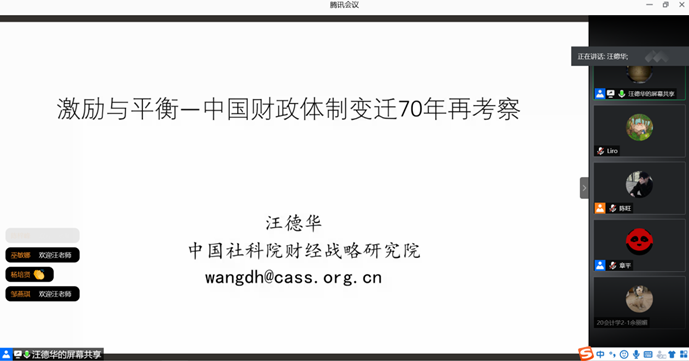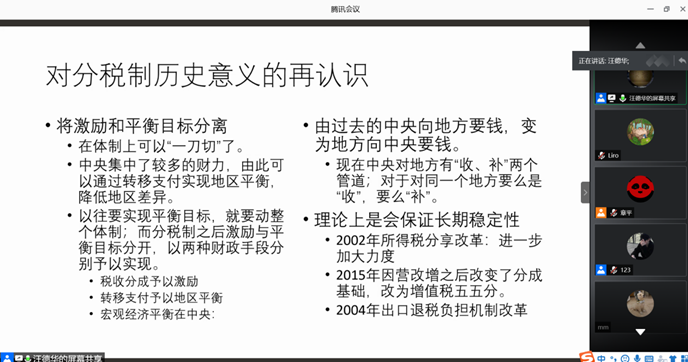3rd Academic Salon for PhD Students in Theoretical Economics in 2021 (the 55th in history): “Incentives and Balances - 70 Years of Change in China's Fiscal Systems”
On the morning of June 25, the 3rd Academic Salon for Ph.D. Students in Theoretical Economics in 2021 (the 55th in history) was staged smoothly by the China Center for Special Economic Zone Research (CCSEZR), Shenzhen University (SZU). The researcher Mr. Wang Dehua delivered a keynote speech entitled "Incentives and Balances - 70 Years of Change in China's Fiscal Systems" in the salon. Associate Professor Zhang Ping of the CCSEZR presided over the lecture. The lecture was held online and was attended by doctoral and master students of the CCSEZR, as well as more than 60 students and teachers from other organizations such as Chinese Academy of Social Sciences and Sun Yat-sen University.

Wang Dehua, Ph.D. in Economics, is currently the researcher and doctoral supervisor at the Institute of Financial Strategy, Chinese Academy of Social Sciences, and the Director of the Fiscal Audit Research Office. He is also the Vice President of China Cost Management Institute, Director of Society of Public Finance of China, Director of China Audit Society, and the member of China Finance 40 Forum (CF40) Youth Forum. His research fields include fiscal theory and policy, fiscal audit, social security, and macroeconomics. He also hosted several research subjects entrusted by National Natural Science Foundation of China (general program), National Social Science Fund of China, foundations of the United Nations, Ministry of Finance, National Audit Office, Budgetary Affairs Commission of the National People's Congress, and the National Development and Reform Commission, etc. He has been one of the creators in chief of the Annual Report on Fiscal Policy of China, and has published many papers in Economic Research Journal and Comparative Studies etc.



Researcher Wang Dehua delivered his lecture from three levels: research motivation and thinking framework, the evolution of fiscal system and rethinking of the historical significance of the tax sharing system. First, the research motivation is to understand the cause of changes in China's fiscal systems. The basic framework of the change includes: direction ("retaking power or delegate power"), method ("Tax-and-Spend" vs "Spend-and-Tax"), form ("hierarchical revenue-sharing" vs "sharing in the total revenue"), and period ("change every year" vs "no change for years"). Second, he analyzed the evolution of China's fiscal system: The establishment of a unified leadership, partition of revenue and expenditure, and hierarchical management system in 1951 - 1957; the exploration of "Spend-and-Tax" and “no change for 5 years” in 1958; the implementation of "sharing in the total revenue" and "change every year" in 1959 - 1970; the continued exploration of decentralization to local government in 1971 - 1976, where the objective and subjective reasons for the decentralization included war preparation, the Third-Front Movement that emphasizing the need to establish an independent and complete national defense industry system at all localities and decentralize power to achieve high targets, as well as Chairman Mao's promotion; the new exploration to recover part of the management rights of enterprises in 1977 - 1978; the division of revenue and expenditure responsibilities and hierarchical contracting in 1980 - 1984; division of tax types, assessment of revenue and expenditure responsibilities, and hierarchical contracting in 1985 - 1987; fiscal responsibility system in 1988 - 1993; and promotion of the reform of fiscal and tax system in 1994 with the change in division of revenue and no change in division of expenditure, as well as transferred amount from original system or subsidy retention. Finally, he discussed the rethinking of the historical significance of the tax-sharing system. The separation of the incentive and balance objectives changed the fiscal mode from the central government asking for money from localities to localities asking for money from the central government which, in theory, may ensure long-term stability. He also provided a final summary of 70 years of change in fiscal systems, pointing out that autonomy is the core of decentralization to localities.
After the lecture, researcher Wang Dehua had an in-depth exchange with the participating students and teachers on the form of the tax-sharing reform, whether the tax-sharing system will restrict the development of the regions with strong economies, and the gaming phenomenon in local finance after the implementation of the tax-sharing system. The salon was informative and insightful to help students sort out the history and economic issues of changes in China's fiscal systems over the past 70 years, which inspired in-depth discussions and follow-up research on related issues and achieved good effects.
(Correspondent: Li Rong)



